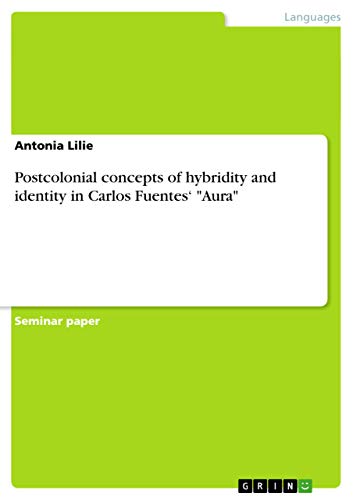Artículos relacionados a Postcolonial concepts of hybridity and identity in...

"Sobre este título" puede pertenecer a otra edición de este libro.
- EditorialGRIN Publishing
- Año de publicación2012
- ISBN 10 3656111456
- ISBN 13 9783656111450
- EncuadernaciónTapa blanda
- Número de edición2
- Número de páginas32
Comprar nuevo
Ver este artículo
Gastos de envío:
EUR 23,00
De Alemania a Estados Unidos de America
Los mejores resultados en AbeBooks
Postcolonial concepts of hybridity and identity in Carlos Fuentes¿ "Aura"
Descripción Taschenbuch. Condición: Neu. This item is printed on demand - it takes 3-4 days longer - Neuware -Seminar paper from the year 2011 in the subject Romance Languages - Latin American Studies, grade: 1,3, University of Toronto, language: English, abstract: In her essay 'Postcolonialism and Latin American literature: the case of Carlos Fuentes' Nadia Lie describes two different currents of Postcolonialism: the first one is the literature that grew out of colonial experience in Latin America and is considered an answer to the over present literature of the oppressing European literary traditions. The second one is characterized by a set of theoretical concerns and reading strategies. Rather than merely 'writing back', a term introduced by Bill Ashcroft, Gareth Griffiths and Helen Tiffin, this approach suggests that cultural differences are constructed by replacing the strong binary opposition 'us' versus 'the other' with concepts of hybridity, in-betweenness and border thinking (see Lie 2005: 139-140). The early work of Mexican author Carlos Fuentes (\*1928) can be seen in an intermediate position between these two concepts. Even though the theme of otherness and opposition is very present in his work, as can be seen in La frontera de cristal (1995) and his early novel Aura (1962), his writing is full of intertextual references that show his appreciation for both European and Latin American literary tradition. As part of the 'Boom' movement in Latin American literature he also uses supernatural and gothic elements that sometimes make it hard or even impossible to distinguish between reality and illusion:According to this aesthetic, unreal things are treated as if realistic and mundane, and mundane things as if unreal. Plots, while often based on real experiences, incorporate strange, fantastic, and legendary elements, mythical peoples, speculative settings, and characters who, while plausible, could also be unreal, and combine the true, the imaginary, and the nonexistent in such a way that they are difficult to separate. (Pope 1996: 229)Fuentes' novel Aura is an early example of this tradition. The purpose of this essay will be a postcolonial approach to the novel, showing Fuentes' position in the discourse of postcolonial identities and literatures. The argument will be based on notions of time, space and intertextual references that can be found in Aura. 16 pp. Englisch. Nº de ref. del artículo: 9783656111450
Postcolonial concepts of hybridity and identity in Carlos Fuentes¿ "Aura"
Descripción Taschenbuch. Condición: Neu. Druck auf Anfrage Neuware - Printed after ordering - Seminar paper from the year 2011 in the subject Romance Languages - Latin American Studies, grade: 1,3, University of Toronto, language: English, abstract: In her essay 'Postcolonialism and Latin American literature: the case of Carlos Fuentes' Nadia Lie describes two different currents of Postcolonialism: the first one is the literature that grew out of colonial experience in Latin America and is considered an answer to the over present literature of the oppressing European literary traditions. The second one is characterized by a set of theoretical concerns and reading strategies. Rather than merely 'writing back', a term introduced by Bill Ashcroft, Gareth Griffiths and Helen Tiffin, this approach suggests that cultural differences are constructed by replacing the strong binary opposition 'us' versus 'the other' with concepts of hybridity, in-betweenness and border thinking (see Lie 2005: 139-140). The early work of Mexican author Carlos Fuentes (\*1928) can be seen in an intermediate position between these two concepts. Even though the theme of otherness and opposition is very present in his work, as can be seen in La frontera de cristal (1995) and his early novel Aura (1962), his writing is full of intertextual references that show his appreciation for both European and Latin American literary tradition. As part of the 'Boom' movement in Latin American literature he also uses supernatural and gothic elements that sometimes make it hard or even impossible to distinguish between reality and illusion:According to this aesthetic, unreal things are treated as if realistic and mundane, and mundane things as if unreal. Plots, while often based on real experiences, incorporate strange, fantastic, and legendary elements, mythical peoples, speculative settings, and characters who, while plausible, could also be unreal, and combine the true, the imaginary, and the nonexistent in such a way that they are difficult to separate. (Pope 1996: 229)Fuentes' novel Aura is an early example of this tradition. The purpose of this essay will be a postcolonial approach to the novel, showing Fuentes' position in the discourse of postcolonial identities and literatures. The argument will be based on notions of time, space and intertextual references that can be found in Aura. Nº de ref. del artículo: 9783656111450

